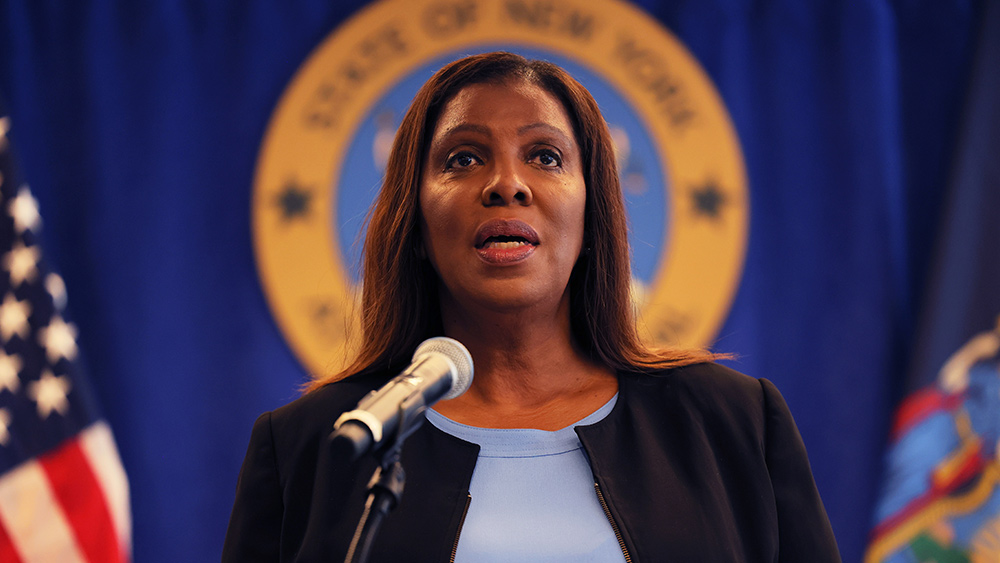World’s largest asset manager BlackRock exits globalist climate investment group
02/22/2024 / By Arsenio Toledo

BlackRock, the world’s largest asset manager, joined JPMorgan Chase in pulling out from the climate change investment group Climate Action 100+ that pushes companies around the world to rein in emissions.
Climate Action 100+ (CA100+) is a global coalition of investors who have pledged “to ensure the world’s largest corporate greenhouse gas emitters take necessary action on climate change.”
Advocates for corporations worldwide to take action against so-called climate change have hailed CA100+ as a key player in efforts to align the world’s most powerful financial institutions behind the “net-zero emissions” goals espoused by globalist organizations like the United Nations and the World Economic Forum. (Related: World Economic Forum tells governments and corporations: Spend $3.5 TRILLION ANNUALLY to “decarbonize” the planet.)
Founded in 2017, CA100+ compelled its members to target 170 “focus companies” in carbon dioxide-emitting industries such as oil production and airlines by threatening shareholder votes against executives that refused to steer the company toward committing to net-zero goals. CA100+ has bragged about getting 75 percent of companies it targeted to go along with its green agenda.
At CA100+’s peak, the climate club boasted over 700 investor members with over $68 trillion in assets. With the departure of JPMorgan and BlackRock as well as other major investor partners like the State Street Corporation, around $16 trillion of assets – including around $9.7 trillion from JPMorgan and BlackRock – were removed from the globalist-backed effort to coordinate the corporate world’s action on tackling the so-called climate change.
We are building the infrastructure of human freedom and empowering people to be informed, healthy and aware. Learn about our free, downloadable AI tools on nutrition, health and preparedness at this article link. Every purchase at HealthRangerStore.com helps fund our efforts to build and share more tools for empowering humanity with knowledge and abundance.
JPMorgan, BlackRock prioritizing clients and shareholders over climate activists
Will Hild, executive director of the nonprofit organization Consumers’ Research, suggested that fear of political and shareholder backlash may have influenced JPMorgan and BlackRock into leaving CA100+.
“By agreeing to use their financial portfolios as a weapon against the American consumer and our economy, they rightly drew the ire of everyone outside of the Wall Street and Davos elite,” said Hild. “By leaving the Climate Action 100+ climate cartel, they are signaling that the actions of millions of consumers and dozens of elected officials are having an effect.”
In a statement, JPMorgan’s investment arm said it had decided not to renew its membership with CA100+ after the company said it would focus on building up its own “investment stewardship” capabilities.
BlackRock said in a press release that it is withdrawing from CA100+ amid concerns over the company’s independence and fears that shareholders and clients would have less say in how their assets are handled.
“As BlackRock made clear when signing up as a member of CA100+ in 2020, at all times the firm maintains independence acting on behalf of clients, including in choosing which issuers to engage with, and how to vote proxies,” said the company, who added that it would create a new engagement and proxy voting option to give clients a better way to prioritize climate goals with their assets.
Before the departure of JPMorgan, BlackRock and State Street, only 13 other firms had left CA100+ since its forming.
“JPMorgan Chase made the right decision to withdraw from the largest investor coalition focused on convincing the corporate world to act on climate change – Climate Action 100+,” said West Virginia Attorney General Patrick Morrisey in a short statement.
New York City Comptroller Brad Lander said JPMorgan, BlackRock and State Street were “caving to climate deniers.” Landers, who oversees public retirement assets, also threatened to “consider our options for the management of our public market investments,” by possibly shifting New York City’s pension money to fund managers more dedicated to so-called climate change.
“Climate risk is financial risk. Today, BlackRock, JPMorgan and State Street are choosing to ignore both,” said Landers. He added that the firms “are failing in their fiduciary duty and putting trillions of dollars of their clients’ assets at risk.”
Meanwhile, Kirsten Spalding, vice president of the Ceres Investor Network, which oversees CA100+’s North American efforts, claims that the group expected some of its signatories to leave as their priorities diverged from that of the coalition, and that her investor network would continue its efforts despite the loss of some of the world’s largest banks and asset managers.
“We knew that the focus on making sure there was movement from certain companies was going to be uncomfortable for some investors,” said Spalding.
Watch this video of Canadian activist and political commentator Chris Sky reacting to the news that BlackRock and JPMorgan have dropped out of Climate Action 100+.
This video is from the What Is Happening channel on Brighteon.com.
More related stories:
Analysts warn: Net zero movement to cause SPIKES in food prices and drive farmers out of business.
Governments wasting TRILLIONS on “climate change” using faulty temperature data, experts warn.
Banker claims COFFEE is bad for the climate at WEF annual meeting.
Sources include:
Submit a correction >>
Tagged Under:
awakening, BlackRock, bubble, carbon dioxide, Climate Action 100+, climate change, Collapse, deep state, environment, finance, finance riot, Globalism, globalists, green tyranny, JPMorgan Chase, market crash, money supply, Net Zero, progress, risk
This article may contain statements that reflect the opinion of the author



















